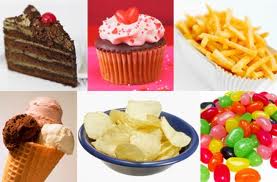Do Food Cravings Indicate a Nutritional Deficiency?
“Sometimes I really strongly crave certain foods. Does that mean I’m deficient in a certain vitamin or nutrient? For example, if I crave orange juice, does that mean I need more vitamin C?”
— Anonymous
So do food cravings indicate a nutritional deficiency?
If cravings were an indicator of nutritional deficiency, we’d all crave fruits  and vegetables. The fact that we all want high carb, high fat comfort foods, along with the research, is a pretty good indicator that cravings aren’t related to deficiencies.”
and vegetables. The fact that we all want high carb, high fat comfort foods, along with the research, is a pretty good indicator that cravings aren’t related to deficiencies.”
The literature backs this assertion: research consistently finds that cravings are most often related to social rather than nutritional cues. Even a commonly perceived craving-culprit, hormonal fluctuation caused by menstrual cycles, turns out to have no measurable impact on cravings. There is one exception: those who crave ice, clay or paste may have pica — an iron deficiency that is most common in women.
But that doesn’t mean that cravings aren’t real — and don’t have a true, physiological origin. Using functional magnetic resonance imaging, researchers have been able to determine that brain regions associated with memory, emotion and — big surprise! – stress – light up when a person is having an intense food craving. And that brain response, in combination with a visual cue, another study found, increases the level of the “hunger hormone,” leptin.
In other words, stress (or sadness or boredom) and external influence conspire to make you feel hunger. And what you crave may be steeped in the culture — such as old tropes, like women crave chocolate, or advertising visuals that command you to “crave” — or it may be based in childhood. Very often, people crave the things that soothed them growing up.
That’s why many commonly craved foods like mac and cheese or grilled cheese sandwiches or cookies — are childhood foods. They are associated with happy memories, with a feeling of being soothed, What’s more, there’s a feedback loop of positive reenforcement. Foods that are high in fat and sugar assist in the production of serotonin, a neurotransmitter that helps us feel calm and relaxed. So when we eat the foods we crave, we remember that it worked and we may return to that same food the next time we need a fix.
So how can you fight the intense cravings you’d rather give up? One recent study found that a morning workout reduced cravings throughout the day. Think long and hard about how you feel when the craving hits. If stress makes you reach for the ice cream, try to look for another way to wind down. Feeling bored as you munch on those chips? Aim to find a low-maintenance hobby that busies your hands and mind. But remember: if by “craving,” you really mean an occasional hankering for a brownie? Just eat the brownie.
